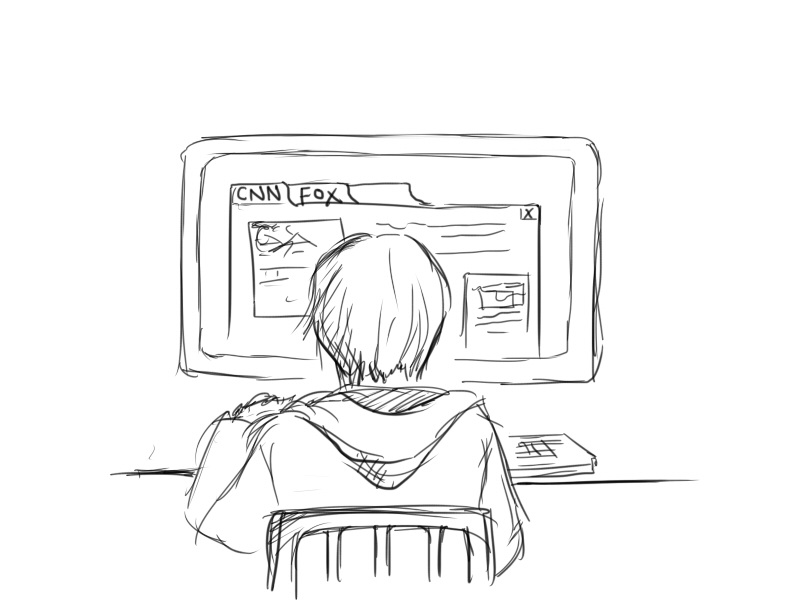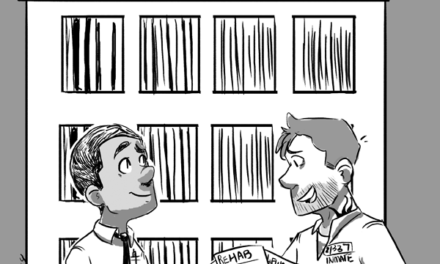When I woke up this morning, before I even got out of bed, I reached for my laptop and opened Facebook, my email and The New York Times website. It’s an almost daily routine; scrolling through friends’ pictures, deleting old Quarantine Summaries and reading today’s headlines are my ways of connecting with the world personally and globally. I imagine I am not the only person who practices this ritual, at least at some point throughout the day.
What is unique about my experience is the particular world to which I am exposed to each morning. As a young liberal college student, I tend to follow pages and read articles pertaining to my interests – specifically liberal pages which generally appeal to young adults.
If I were an older conservative woman, I do not imagine I would be reading a post by a Facebook page called “The Beer Party” telling me to thank a union member for my three-day weekend (which is in fact a surprisingly poignant page that I follow).
Rather, I would likely see something from a popular conservative Facebook page like “Being Conservative” about how President Obama wants to cut my Social Security benefits.
In today’s contradictory climate of information saturation and profound ignorance about the world around us, the middle ground is hard to find. Between Facebook, Twitter and a wealth of other social media sites out there, how can I keep up with and trust the top stories without feeling overwhelmed?
The solution for many of us is to pay attention to only the things we already agree with. This is easy, and it makes us feel current without having to think too hard.
However, this practice is also dangerous. A redundancy of information may be just as harmful as no information at all. If I keep hearing the same thing over and over again, I may start to believe it regardless of whether or not it is true.
This is a mantra the Koch brothers, who are still affiliated with Koch Industries, one of the largest private industries in America, have adopted in order to support their own political agenda. With a web of funding reaching think tanks, academics, media outlets, pundits and politicians and political campaigns, they create an echo chamber resonating with anti-government positions and ideals.
The pundits go on news stations and cite position papers published by Koch-funded organizations. Koch-funded politicians then go on to espouse these same ideas, supported by both the papers and the media. It would be hard not to believe such compelling assurances.
Of course, we as consumers of this information get stuck in the middle, much to our own detriment.
Who and what should we trust? How do we know that the news we are exposed to is reliable?
To answer these questions one need only take a lesson from the core of a liberal arts education – namely, well-roundedness. As with most things, a diversity of information can help to mitigate some of these issues of uncertainty.
Watch MSNBC. Watch Fox News. Read The New York Times and The Wall Street Journal.
But always take what you consume with a grain of salt.
Be your own reporter, use a variety of sources and certainly do not create your own echo chamber for yourself.
What’s more is that what I’m proposing is neither revolutionary nor all too difficult to accomplish. Follow a variety of pages on Twitter and Facebook, and flip back and forth between news channels every once in a while. You might even take it a step further and read an article or two from an independent news source. After all, the freedom of the press may be guaranteed by the U.S. Constitution – as it is indeed necessary for the functioning of a democracy.
But it is the duty of the public to take advantage of this right in order to ensure the continuing health of our democracy.
William Hupp is a College junior from Little Rock, Ark.
The Emory Wheel was founded in 1919 and is currently the only independent, student-run newspaper of Emory University. The Wheel publishes weekly on Wednesdays during the academic year, except during University holidays and scheduled publication intermissions.
The Wheel is financially and editorially independent from the University. All of its content is generated by the Wheel’s more than 100 student staff members and contributing writers, and its printing costs are covered by profits from self-generated advertising sales.






..while your rant about the Koch Brothers (and only pointing out the conservative Koch Brothers without a liberal equivalent, and there are plenty) is pretty ironic given the nature of the rest of the article.. this is an excellent piece and it resonates with something I’ve been discussing with anyone who has been interested for a long time. Reading about an issue from a wealth of different sources is the only way to make sure you do not get into informational political gridlock by only reading news you agree with. This is why I appreciate independent media and some news aggregate services like AllSides, which shows the left, right, and center viewpoints on current events.
….And I’d say there’s more than just red or blue in popular politics these days. Red, Blue, Gold, Purple.